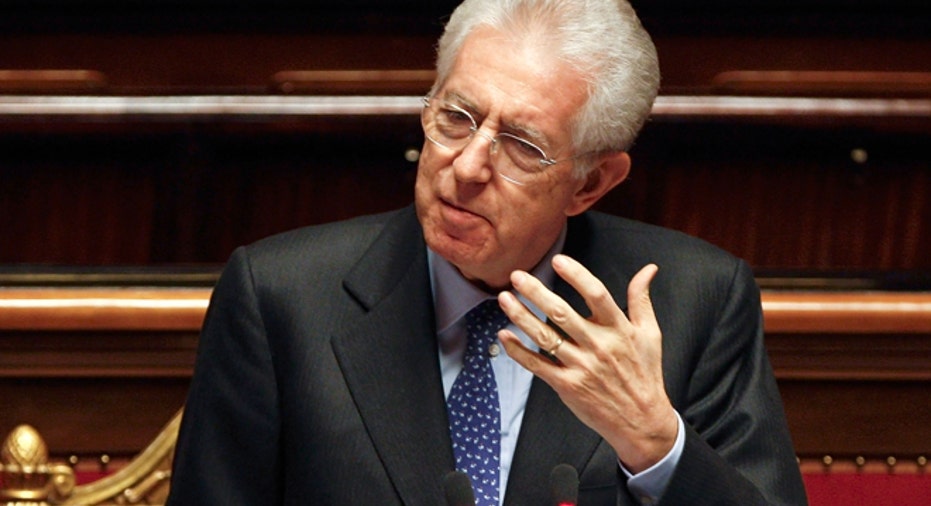New Italy PM Wins Confidence Vote on Tough Reform Plans

ROME – Italian Prime Minister Mario Monti comfortably won a vote of confidence in his new government on Thursday after promising rigour and fairness in painful reforms to dig the country out of a financial crisis that threatens the entire euro zone.
Outlining his programme earlier in the day, Monti, 68, told the Senate that the survival of the euro partly depended on Italy embarking on radical reforms within weeks. The European Union is facing its most difficult challenge, he added.
Monti won the vote in the Senate by 281 votes to 25, with only the pro-devolution Northern League voting against him.
He faces another confidence vote in the Chamber of Deputies, the lower house, at around 1300 GMT on Friday which he is also expected to win comfortably, after which he will be fully empowered.
"The government recognises that it was formed to resolve a serious emergency," Monti said, setting out sweeping reforms to welfare, pensions and the labour market that are expected to be unpopular.
Monti, who was sworn in on Wednesday at the head of a technocrat government after a rushed transition from discredited ex-premier Silvio Berlusconi, said Italy risked having its fate decided by other countries if it did not act.
If it failed, things would get worse, especially for vulnerable members of the population.
The economist is racing to try to end a collapse in market confidence that has pushed Rome's borrowing costs to critical levels.
He spoke on Thursday to French President Nicolas Sarkozy and German Chancellor Angela Merkel about the euro zone debt crisis, the three leaders said in a statement.
The new premier said he would consider more reforms after implementing pledges made to the EU but never passed by Berlusconi.
Monti said action to vanquish an emergency that has put the euro zone's third largest economy at the centre of its expanding debt crisis would focus equally on cutting a huge public debt and boosting chronically weak growth.
He pledged to target widespread tax evasion, sub-standard education and training and Italy's creaking welfare system, as well as reforming a labour market that gives excessive protection to some workers at the expense of others, most of them young.
In a 45-minute address, he said the main goals of his technocrat government would be to improve public services and help women and young people to get jobs, calling them "the two great wasted resources of our country".
DISPARITIES
Monti said he would reform the pension system to remove unfair disparities and also signalled the government would re-introduce a tax on first homes that was abolished by Berlusconi.
He would also sell off public assets, while lower taxes on labour and output would be balanced by higher levies on consumption.
Italy's notoriously closed professions would be opened up in a major campaign to liberalise the economy, he said.
In another shot at a chronic problem, Monti said the use of cash should be reduced by law, to cut an underground economy that accounts for nearly 20 percent of GDP.
He promised to reduce the cost of Italy's political system and cosseted politicians, which caused increasing public outrage under Berlusconi's outgoing government.
"Given the sacrifices required of citizens, action to contain the cost of elective bodies is unavoidable," said the former European Commissioner and university professor.
He was comforted in his daunting task by an opinion poll that said 73 percent of those surveyed said they were confident of his ability to lead an extraordinary effort to fix Italy's problems. Even 60 percent of voters from the centre-right, the bloc which backed Berlusconi, said they had faith in Monti.
But there were early signals of the problems facing the new prime minister, who has taken the economy portfolio himself.
Fitch's rating agency said a sharp economic downturn had already made his job more difficult, with rising unemployment likely to undermine support for austerity.
Berlusconi, after a few days of silence following his ignominious exit on Saturday, told deputies from his PDL party that the new unelected government was imposed on the country by President Giorgio Napolitano. He said it would last only as long as the PDL wanted.
Monti will need strong parliamentary support for radical reforms that have been promised by most of the parties, but could evaporate as the measures become more unpopular.
There was also opposition on the streets where thousands of people protested in several cities against what they called a "bankers' government". Protesters clashed with police in the business capital of Milan and in Turin.
With the euro zone debt crisis spreading wider by the day, Monti's policies are unlikely to be enough on their own to rebuild shattered market confidence.
But they will be vital to restoring credibility with international partners who had long lost patience with the repeatedly unfulfilled promises of Monti's flamboyant predecessor Berlusconi.
The uphill task Monti faces was underlined by the continued pressure on Italian borrowing costs.
Yields on 10-year benchmark bonds fell after Monti's speech but still hovered around 7 percent, near the levels that forced Greece and Ireland to seek an international bailout.
Italy's 1.8 trillion euro public debt would overwhelm the euro zone's current financial defences.



















